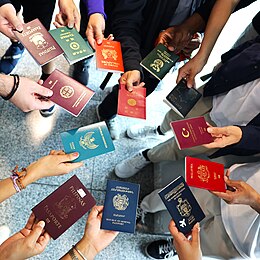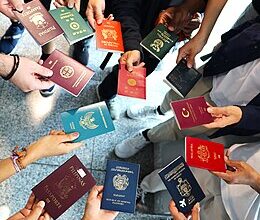
By: Usman Sultan & Mustapha Lawal
Visa policies have long been a reflection of a nation’s economic priorities, diplomatic strategies, and security concerns. With the UK’s latest immigration changes, we see a fundamental shift that mirrors broader global trends in visa regulations.
The tightening of entry requirements is part of a growing international pattern where countries emphasize local workforce development and limit migration opportunities. This shift raises critical questions about accessibility, fairness, and the future of global mobility, particularly for Nigerians and other African travelers.
One of the most consequential policy changes is the closure of the Social Care Worker Visa route, a development that directly impacts thousands of Nigerians who relied on this pathway for employment. Previously, the UK welcomed a significant number of migrants to fill gaps in social care services, but with this route now closed, aspiring workers must either explore alternative options or reconsider their migration plans entirely. This move underscores how governments are increasingly tightening control over labor migration, ensuring that foreign workers are admitted only under stricter conditions that align with national workforce priorities.
Beyond labor visas, the student migration landscape is also evolving. With the Post-Study Work Visa duration reduced from two years to 18 months, international students now face increased pressure to secure employment soon after graduation or risk returning home without stable prospects. At the same time, UK universities will need to comply with tighter sponsorship regulations, making it more difficult for Nigerian students to gain admission. The introduction of higher financial requirements for dependents further compounds the challenges for aspiring students, as many rely on family support when studying abroad. These restrictions highlight a growing global trend where nations prioritize economic self-sufficiency over international education exchanges, inadvertently reducing accessibility for students from developing nations.
Read Also: The Unseen Borders: A Journey Through the World of Visas (Part 1)
Meanwhile, the UK’s permanent residency criteria have become significantly tougher, increasing the settlement requirement from five years to ten years. This extension places a major hurdle before skilled workers hoping to establish long-term careers in the UK. Moreover, employers hiring foreign workers now face a 32% increase in Immigration Skills Charges, disincentivizing the sponsorship of African professionals. These changes align with a worldwide movement where countries seek to protect domestic labor markets by discouraging prolonged foreign employment. As these policies take effect, African professionals must reconsider their migration strategies and weigh the long-term viability of working abroad.
These policy adjustments illustrate a broader change in visa trends, affecting not just Nigerian travelers but migrants worldwide. In this latest article from our The Unseen Borders: A Journey Through the World of Visas, we examine how such reforms reshape international migration, global employment dynamics, and accessibility to new opportunities. We explore how tightening visa requirements reflect economic restructuring, migration control, and shifts in diplomatic strategy, all shaping the future of cross-border movement.
Read Also: The Unseen Borders: A Journey Through the World of Visas (Part 2)
As visa policies continue to evolve, it becomes crucial to understand their implications, anticipate future trends, and equip migrants with the knowledge to navigate a shifting global landscape. Visa policies that were once the standard are becoming outdated in the face of global shifts. Just as technology has changed the way we communicate and do business, it is also transforming how we travel. The traditional image of visa applications—paper forms, long lines, and endless waiting—has started to fade, replaced by new trends that promise to make travel easier and faster. Yet, the process remains complex, with some regions moving forward while others lag behind.
In recent years, the E-Visa has emerged as a game-changer in the world of travel. What was once a tedious, time-consuming process being now a digital breeze for many travelers. With over 50 countries now offering E-Visa systems, travelers can apply online, upload documents, and receive their visa approvals without ever stepping into a consulate. Countries like Turkey, India, Kenya, and the United Arab Emirates (UAE) have embraced this shift, offering fast, secure, and efficient online platforms.
Nigeria, along with many other countries, is making strides in digitizing its systems, and the E-Visa revolution is an integral part of this global trend. This shift in visa policy is especially beneficial for travelers from countries that previously faced bureaucratic roadblocks—making it easier to experience the world without getting tangled in paperwork.
To explore the growing list of countries offering E-Visas, visit VisaHQ or iVisa for up-to-date information on e-visa applications.
As global travel continues to rise, so too does the need for countries to collaborate for easier movement of people. Regional integration is becoming a vital solution to visa woes, especially in regions like East Africa. The East African Tourist Visa allows travelers to visit Kenya, Uganda, and Rwanda on a single visa—like a “super-pass” for adventure and exploration. This has made traveling between these countries simpler and more efficient.
Meanwhile, in West Africa, the ECOWAS (Economic Community of West African States) passport facilitates visa-free travel between 15 member states. This policy encourages trade, tourism, and cultural exchange, promoting regional cooperation. However, not all regions are as connected, and areas outside of ECOWAS still make travel difficult for African passport holders.
While East Africa is leading the charge with initiatives like the EATV, other regions like the Southern African Development Community (SADC) still face challenges in harmonizing their visa policies. The goal, however, is clear: regional cooperation can streamline travel within specific geographical areas and open up new opportunities for business and cultural exchange.
For more details on the East African Tourist Visa, check the official site: EAC.
Imagine a passport that allows you to travel to over 190 countries without needing a visa. This is the reality for passport holders from Japan, Germany, and South Korea, whose global mobility places them at the top of the visa-free travel hierarchy. Unfortunately, many African passport holders—such as those from Nigeria—are not afforded this luxury. Nigerian citizens face restrictions in much of Europe, the United States, and parts of Asia.
Read Also: The Unseen Borders: A Journey Through the World of Visas (Part 3)
However, there’s a glimmer of hope. African nations like Rwanda, Seychelles, and Mauritius are slowly changing the status quo by offering visa-free access to travelers from several African countries. This shift indicates a growing trend among African nations to promote regional and continental mobility—a vital step toward increasing Africa’s global connectivity.
To check visa-free access for your country, visit Passport Index for an interactive guide on visa-free countries.
The future of global travel is changing fast. The rise of E-Visas, Visa on Arrival policies, and regional visa agreements are reshaping the way we experience the world. Countries that understand the value of increased mobility and global cooperation are adjusting their visa systems to reflect this interconnectedness.
But, as the proverb goes, “If the hunter doesn’t come home, the lion will go to the hunter’s house.” Travel, now a vital part of our global economy, is the new hunt. It is imperative that countries open their gates to foster a global exchange of ideas, people, and cultures. As visa policies evolve, the hope is that more doors will be unlocked, creating a more inclusive world for travelers everywhere.
Most Powerful and Least Powerful Passports: The Global Mobility Divide
When it comes to travel, the color of your passport often determines how smooth your journey will be. It’s no secret that a Nigerian passport doesn’t hold the same weight as passports from countries like the U.S. or Germany. This disparity in passport strength explains why some people go to great lengths—changing citizenships, applying for dual nationality, or even seeking residency in visa-friendly countries—to improve their travel options.
However, for those who choose to stay loyal to their green passport, there are still ways to ease travel restrictions. Some Nigerians have taken advantage of second passports from Caribbean nations like Grenada or St. Kitts & Nevis, which can unlock easier visa processes and increased global mobility.
But what exactly makes a passport powerful? It’s all about visa-free access, visa-on-arrival agreements, and overall global mobility. The more countries a passport holder can visit without needing a visa, the stronger that passport is considered. However, as we’ll see, not all passports are created equal.
At the top of the global passport power index, countries like Japan, Singapore, and Germany dominate the charts. These passports grant their holders visa-free or visa-on-arrival access to over 190 destinations, making international travel almost effortless for their citizens.
Top 5 Most Powerful Passports (2024 Rankings):
1️⃣ Japan – 193 visa-free destinations
2️⃣ Singapore – 193 visa-free destinations
3️⃣ Germany – 192 visa-free destinations
4️⃣ Spain – 191 visa-free destinations
5️⃣ Finland, Italy, France – 190 visa-free destinations
With these passports, travelers have the luxury of packing a suitcase and jumping on a plane without worrying about the typical visa headaches. For example, a Japanese business person can spontaneously decide to visit the U.S., the UK, or any Schengen country, and the only thing they need to consider is booking their flight—visa applications are already taken care of.
🔹 Why Are These Passports Powerful?
These passports come from countries with strong diplomatic ties, stable economies, and a low risk of illegal immigration or overstaying. As a result, their citizens are considered “desirable travelers” in the eyes of most countries.
For a detailed list of visa-free countries for these passports, check out Henley Passport Index.
On the flip side, we have passports that carry an immense burden when it comes to travel. For these passport holders, the road to international travel is filled with paperwork, background checks, and long waits. Unfortunately, many of the world’s least powerful passports belong to countries facing economic instability, conflict, or diplomatic tensions.
Bottom 5 Least Powerful Passports (2024 Rankings):
1️⃣ Afghanistan – 27 visa-free destinations
2️⃣ Iraq – 29 visa-free destinations
3️⃣ Syria – 30 visa-free destinations
4️⃣ Pakistan – 32 visa-free destinations
5️⃣ Yemen – 34 visa-free destinations
For people from these countries, obtaining a visa is often a grueling process. Embassies demand comprehensive documentation, proof of financial stability, and sometimes even interviews just to apply. Many applicants are denied entry, not because they don’t meet the requirements, but simply because of the passport they hold.
Why Are These Passports Weak?
Political instability, ongoing conflicts, and high rates of illegal immigration make these passports much less desirable to most countries. In many cases, the strained diplomatic relationships between these nations and major countries contribute to the travel restrictions faced by their citizens.
Now let’s focus on Nigeria. The Nigerian passport isn’t the worst, but it doesn’t enjoy the privileges of the world’s most powerful passports either. As of 2024, the Nigerian passport ranks 98th globally, offering visa-free or visa-on-arrival access to only 45 countries. This puts Nigeria at a serious travel disadvantage compared to countries like Japan, which offers access to 193 destinations.
Countries Nigerians Can Visit Visa-Free or with Visa on Arrival (Selected Examples):
- Visa-Free: Ghana, Benin, Seychelles, Barbados, Dominica
- Visa on Arrival: Maldives, Kenya, Ethiopia, Rwanda
- Major Visa Restrictions: USA, UK, Schengen Area, UAE
For Nigerians, the visa application process can be a long and stressful ordeal. Embassies require proof of funds, return tickets, and hotel bookings before granting a visa. Even with all the necessary documents, there’s still a chance of visa rejection due to vague reasons like “insufficient ties to the home country.”
What Makes the Nigerian Passport Weak?
High rates of overstay and illegal migration, weak diplomatic ties with Western countries, and concerns about visa fraud contribute to the Nigerian passport’s limited travel freedom.
Passport strength is not just about the country’s passport design or color. A combination of political and economic factors determines how easy it is for citizens to move across borders. Here are a few key factors:
✅ Bilateral Agreements – Countries with strong international relationships often have visa waiver agreements, giving their citizens more mobility.
✅ Economic Strength – Nations with strong economies (e.g., Germany, Japan) are often viewed as stable and desirable, making their citizens more trusted in the visa application process.
✅ Security and Immigration History – Countries with high rates of illegal migration or security risks face stricter visa policies due to concerns over overstays or asylum seekers.
While African passports continue to lag behind in strength, initiatives like the African Union (AU) passport are working to improve intra-continental travel freedom.
To learn more about how the African Union is working on improving travel within Africa, visit AU Passport.
The disparity between passport powers highlights the broader inequalities in global mobility. As visa policies continue to evolve, we can hope for a future where passport strength isn’t determined by economic power or geopolitical interests alone, but by a fairer and more inclusive approach. Diplomatic ties, economic strength, and security concerns will always be factors, but the ongoing push for regional cooperation (like the AU passport) and global integration could be the key to reshaping the travel landscape.
The world is becoming more interconnected, and as visa policies change, there’s a growing sense of optimism that travel will one day be more about opportunity and less about restrictions.



